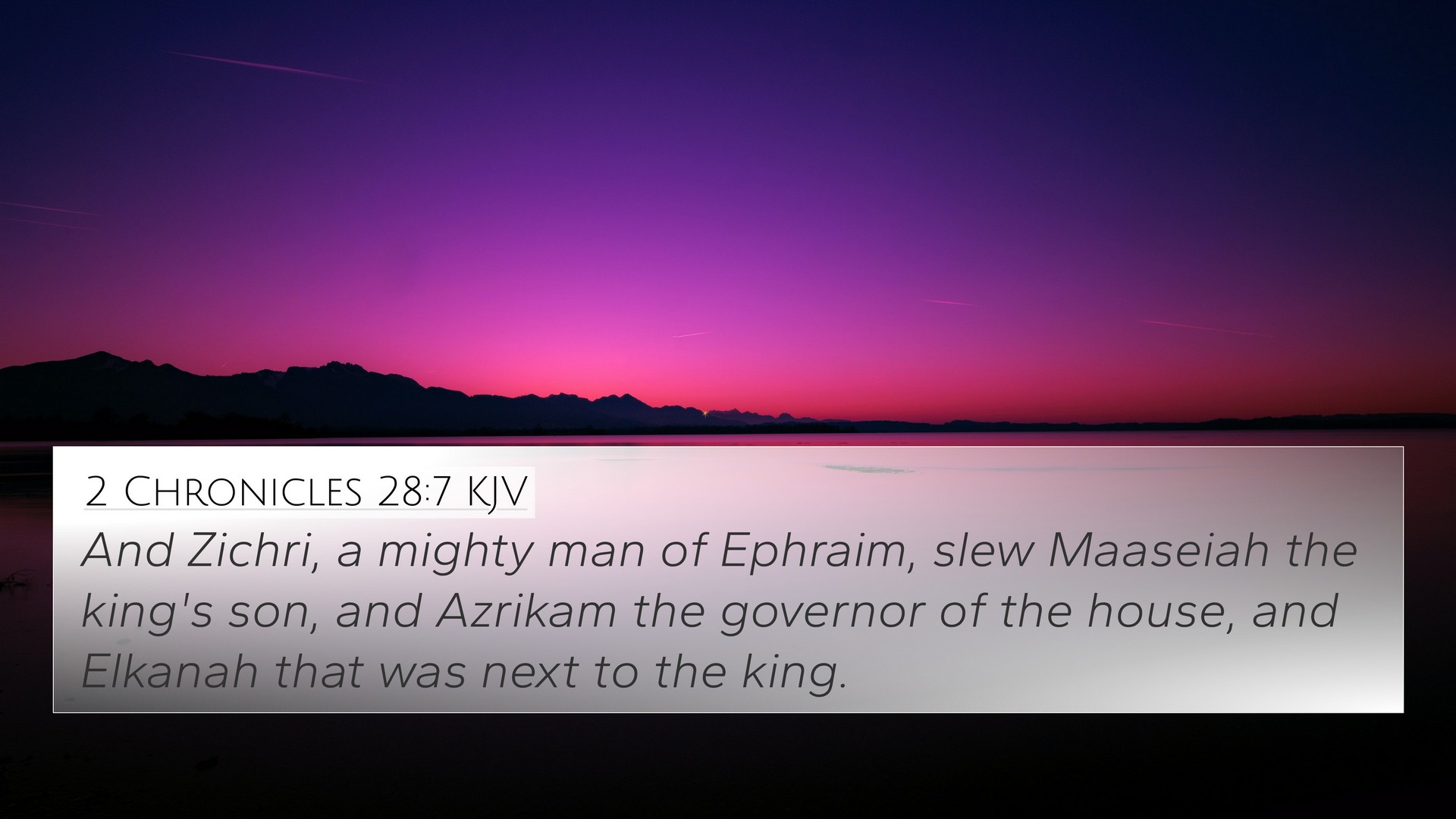Understanding 2 Chronicles 28:7 - A Combined Commentary Insight
The verse 2 Chronicles 28:7 narrates a pivotal moment in the history of Judah, offering insight into the consequences of disobedience and the severity of conflict. The text states:
“And Zichri, a mighty man of Ephraim, slew Maaseiah the king’s son, and Azrikam the governor of the house, and Elkanah that was next to the king.” (2 Chronicles 28:7, KJV)
Verse Summary
This verse reflects a time of turmoil and strife during the reign of King Ahaz of Judah, where internal and external conflicts culminate in violence. The assassination of key figures within the royal administration—a king’s son and two prominent leaders—shows the susceptibility of even the highest offices to political factions and personal grievances.
Commentary Insights
Matthew Henry's Commentary
Matthew Henry emphasizes the gravity of the actions described in this passage. He notes that Zichri, a leader from Ephraim, took decisive and violent action against the king’s men. This act signifies not merely a personal vendetta but also the broader national issues of the time, highlighting the instability in the Northern Kingdom and the divide it created with Judah:
- The Role of Ephraim: Ephraim, representing the Northern Kingdom, was often in conflict with Judah. Henry discusses the significance of inter-tribal conflict and the repercussions of such hostilities.
- The Implications of Leadership: The targeting of the king’s son demonstrates the vulnerability of leadership during times of moral and spiritual decay.
Albert Barnes' Notes
Albert Barnes sheds light on the identity and motivations of Zichri. He explains that the violent act was likely motivated by political aspirations or revenge:
- Political Turmoil: Barnes links this event to the broader context of Ahaz’s reign, marked by idolatry and rebellion against God, leading to divine judgment.
- Significant Figures: The mention of high-ranking officials such as Maaseiah and Azrikam indicates the high stakes involved, reflecting the dangers faced by those in power.
Adam Clarke's Commentary
Clarke provides additional background regarding the societal conditions that led to such violence, pointing the reader to consider the fear and unrest prevalent among the populace:
- Moral Decline: He emphasizes that the moral decay of the society and the abandonment of God resulted in chaos, where assassination became a tool for resolving disputes.
- Context of War: The conflict outlined is not just a physical battle but also a spiritual one, entrenched in the ongoing struggles of the Israelites against their enemies and their own sinful nature.
Bible Verse Cross-References
To fully appreciate the context and implications of 2 Chronicles 28:7, consider the following cross-referenced verses:
- 2 Kings 16:10-16 - This passage provides details on King Ahaz’s reign and his actions, highlighting the king's disobedience to God and his reliance on foreign powers.
- Isaiah 7:1-2 - This verse discusses the political situation during Ahaz’s rule, revealing the fear and conspiracy against Judah.
- 2 Chronicles 28:5 - This verse explains the judgment God brings upon Judah due to their sin, setting the stage for internal strife.
- Micah 5:1 - A prophetic verse that ties into the challenges faced by leadership during this tumultuous time.
- 2 Samuel 20:9-10 - An earlier case of political assassinations that reflect the dangerous nature of leadership in Israel.
- 1 Kings 16:7 - This verse illustrates the violence associated with the line of kings in Israel, emphasizing the danger of political power struggles.
- Proverbs 28:5 - A proverb that reiterates the theme of justice and the consequences of wickedness in leadership.
- Jeremiah 7:12-14 - Offers insight into the consequences of Judah’s disobedience, tying it back to the events that led to divisions and conflicts.
- Matthew 26:55-56 - Connects the concept of betrayal and violence in leadership, showing its continuity throughout scripture.
- Romans 13:1-4 - Though from the New Testament, it provides a perspective on the role of authority and the responsibility of leaders, contrasting the situations in the Old Testament.
Thematic Connections
The themes present in 2 Chronicles 28:7 resonate throughout the entire Bible, offering a profound meditation on leadership, morality, and the nature of conflict. These thematic connections help provide a clearer understanding of how this verse fits within the broader narrative:
- Leadership and Judgment: The connection between leadership failures and divine judgment can be traced from ancient Israel’s history to modern reflections on authority.
- Violence as a Response: The use of violence in resolving disputes is a recurring theme throughout Scripture, offering a cautionary tale against the backdrop of righteous living.
- Inter-Biblical Dialogue: The discussion of leadership and moral choices is echoed through the writings of the prophets and the teachings of the New Testament.
Conclusion
2 Chronicles 28:7 serves as a stark reminder of the consequences of disobedience and unrest within a nation. By drawing from various public domain commentaries and the connections to other scripture, we gain a richer understanding of its meaning. This verse highlights the importance of moral integrity in leadership and the profound impact of collective disobedience on society.
Tools for Further Study
For readers interested in exploring the implications of this verse through cross-referencing:
- Bible Concordance: A key resource for finding related verses and exploring themes.
- Cross-Reference Bible Study: Techniques such as thematic analysis can enhance comprehension of scriptural connections.
- Bible Reference Resources: Utilizing tools specifically designed for linking Bible scriptures enables deeper exploration of relationships within the text.






